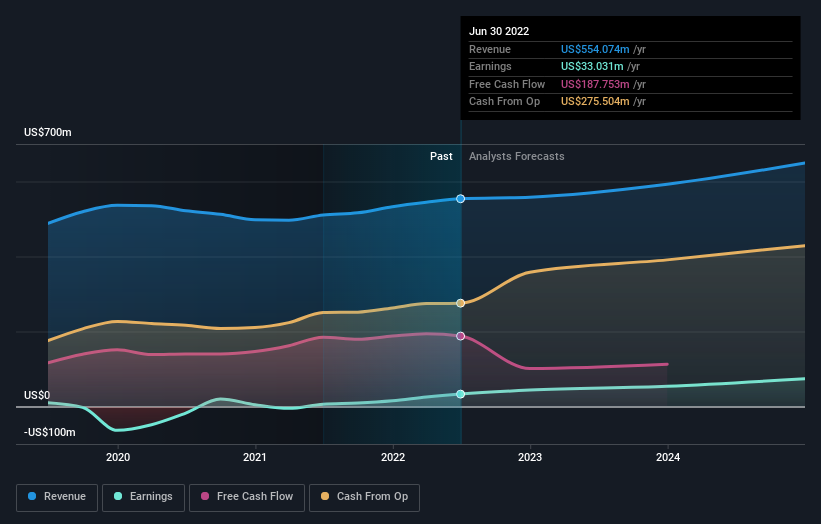- United States
- /
- Retail REITs
- /
- NasdaqGS:PECO
Institutional investors control 71% of Phillips Edison & Company, Inc. (NASDAQ:PECO) and were rewarded last week after stock increased 3.2%

A look at the shareholders of Phillips Edison & Company, Inc. (NASDAQ:PECO) can tell us which group is most powerful. We can see that institutions own the lion's share in the company with 71% ownership. That is, the group stands to benefit the most if the stock rises (or lose the most if there is a downturn).
Last week’s 3.2% gain means that institutional investors were on the positive end of the spectrum even as the company has shown strong longer-term trends. The gains from last week would have further boosted the one-year return to shareholders which currently stand at 17%.
Let's delve deeper into each type of owner of Phillips Edison, beginning with the chart below.
However if you'd rather see where the opportunities and risks are within PECO's industry, you can check out our analysis on the US REITs industry.

What Does The Institutional Ownership Tell Us About Phillips Edison?
Institutional investors commonly compare their own returns to the returns of a commonly followed index. So they generally do consider buying larger companies that are included in the relevant benchmark index.
Phillips Edison already has institutions on the share registry. Indeed, they own a respectable stake in the company. This can indicate that the company has a certain degree of credibility in the investment community. However, it is best to be wary of relying on the supposed validation that comes with institutional investors. They too, get it wrong sometimes. When multiple institutions own a stock, there's always a risk that they are in a 'crowded trade'. When such a trade goes wrong, multiple parties may compete to sell stock fast. This risk is higher in a company without a history of growth. You can see Phillips Edison's historic earnings and revenue below, but keep in mind there's always more to the story.

Since institutional investors own more than half the issued stock, the board will likely have to pay attention to their preferences. Phillips Edison is not owned by hedge funds. Looking at our data, we can see that the largest shareholder is The Vanguard Group, Inc. with 14% of shares outstanding. Meanwhile, the second and third largest shareholders, hold 8.1% and 7.7%, of the shares outstanding, respectively.
Looking at the shareholder registry, we can see that 51% of the ownership is controlled by the top 11 shareholders, meaning that no single shareholder has a majority interest in the ownership.
While studying institutional ownership for a company can add value to your research, it is also a good practice to research analyst recommendations to get a deeper understand of a stock's expected performance. There are plenty of analysts covering the stock, so it might be worth seeing what they are forecasting, too.
Insider Ownership Of Phillips Edison
The definition of company insiders can be subjective and does vary between jurisdictions. Our data reflects individual insiders, capturing board members at the very least. Management ultimately answers to the board. However, it is not uncommon for managers to be executive board members, especially if they are a founder or the CEO.
Most consider insider ownership a positive because it can indicate the board is well aligned with other shareholders. However, on some occasions too much power is concentrated within this group.
Our data suggests that insiders own under 1% of Phillips Edison & Company, Inc. in their own names. Keep in mind that it's a big company, and the insiders own US$16m worth of shares. The absolute value might be more important than the proportional share. It is always good to see at least some insider ownership, but it might be worth checking if those insiders have been selling.
General Public Ownership
The general public-- including retail investors -- own 28% stake in the company, and hence can't easily be ignored. While this size of ownership may not be enough to sway a policy decision in their favour, they can still make a collective impact on company policies.
Next Steps:
I find it very interesting to look at who exactly owns a company. But to truly gain insight, we need to consider other information, too. Be aware that Phillips Edison is showing 3 warning signs in our investment analysis , and 1 of those is a bit concerning...
If you are like me, you may want to think about whether this company will grow or shrink. Luckily, you can check this free report showing analyst forecasts for its future.
NB: Figures in this article are calculated using data from the last twelve months, which refer to the 12-month period ending on the last date of the month the financial statement is dated. This may not be consistent with full year annual report figures.
New: Manage All Your Stock Portfolios in One Place
We've created the ultimate portfolio companion for stock investors, and it's free.
• Connect an unlimited number of Portfolios and see your total in one currency
• Be alerted to new Warning Signs or Risks via email or mobile
• Track the Fair Value of your stocks
Have feedback on this article? Concerned about the content? Get in touch with us directly. Alternatively, email editorial-team (at) simplywallst.com.
This article by Simply Wall St is general in nature. We provide commentary based on historical data and analyst forecasts only using an unbiased methodology and our articles are not intended to be financial advice. It does not constitute a recommendation to buy or sell any stock, and does not take account of your objectives, or your financial situation. We aim to bring you long-term focused analysis driven by fundamental data. Note that our analysis may not factor in the latest price-sensitive company announcements or qualitative material. Simply Wall St has no position in any stocks mentioned.
About NasdaqGS:PECO
Phillips Edison
Phillips Edison & Company, Inc. (“PECO”) is one of the nation’s largest owners and operators of omni-channel grocery-anchored shopping centers.
Second-rate dividend payer with limited growth.
Similar Companies
Market Insights
Community Narratives




